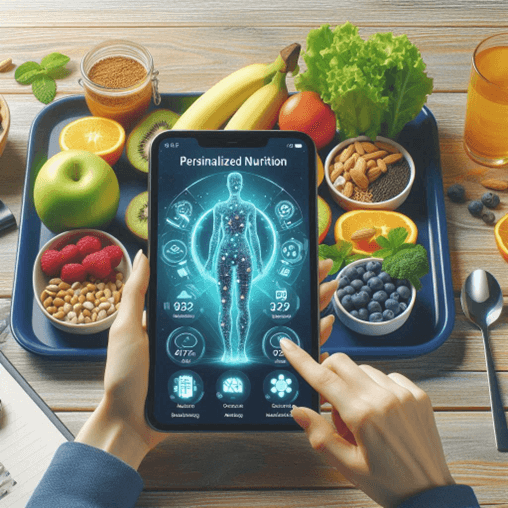Personalized Nutrition App Market: How Data-Driven Diets Are Transforming Wellness?
Published Date: 04 Nov 2024
In recent years, the personalized nutrition app market has transformed the way a person might now approach wellness goals. Data-driven diets began to rise, allowing people access to specially tailored nutrition plans according to what each one needs or even prefers. Such innovative apps unlock user data, such as dietary preferences, health goals, and in some cases, genetic information, to present customized meal plans, recipe suggestions, and nutritional advice. It not only empowers the person to make an informed decision about his diet but also enables one to track their progress. Additionally, by using technologies such as artificial intelligence and machine learning, these personalized nutrition applications have become more precise and efficient.

These applications can provide precise recommendations based on several considerations such as dietary restrictions, food sensitivities, and even lifestyle choices through data analysis of vast volumes. Hence, with the development of a personalized nutrition app, a new evolution has emerged in how well individuals manage wellness-wise by taking a more proactive approach to nutrition, tailored to individual specifications. Shaped the way of wellness in the future, data-driven diets promise to be able to improve overall health outcomes and promote sustainable lifestyles.
How does this app work?
Most of these apps use algorithms that interpret user data to give recommendations tailored to each individual. Users normally input basic information concerning a person's age, weight, height, dietary preferences, and health goals. The more complex apps even integrate biometric data from wearable devices for a clearer image of health.
Some major features of these apps include:
1) Customized Diet Plans: Apps offer user profiles and avail diet plans that align with their health goals which include weight loss, muscle gain, or managing some health issues.
2) Nutrient Intake Tracking: User can record their food in almost all apps, and these apps provide the most important information concerning nutrient intake and areas for improvement.
3) Monitoring Progress: Continuous measurements of weight, energy, and other health indicators can be observed over time to give an understanding of how diet impacts general well-being.
4) Recipe Suggestion: Recipes that users will love but still meet their nutritional needs are provided to them.
Benefits of Using Personalized Nutrition Apps:
You are going to be more responsible about meeting your health goals through tailored meal plans and tracking progress. Such apps can give information concerning the nutritional value of various foodstuffs, therefore allowing people to make such informed decisions.
1) Convenience and Accessibility: A nutritionist in your pocket makes it easy to access guidance at any time anywhere.
2) Community Support: Many apps offer forums or social features where users can share experiences and motivate each other to reach their goals.
3) Improved Health Outcomes: Tailored nutrition plans result in weight control, increased energy, and decreased risk of chronic disease.
4) Cost-Effective: It saves on the cost of healthcare by not only avoiding chronic disease but also by eliminating all the extra supplements that do not need to be taken.
Some Tips App Selection:
1) Evaluate your Goals: Is it weight loss, building muscle, or better eating? Think of the app that supports that.
2) Check if the app has customization features. Ensure that it will include your preferences, allergies, and other dietary restrictions.
3) Look at community features. As with other fellow users within an app, motivation and insights from fellow users increase.
4) Read reviews: Find out what others thought of the app before it came to your shores so you can get an idea of its efficacy and usability before committing.
How Data-Driven Diets Are Transforming Wellness:
- Genetic-Based Nutrition: Integrating genetic data to provide personalized nutrient recommendations.
- AI-Powered Meal Planning: Individualized meal plans according to each person's dietary needs, likes, and lifestyle.
- Real-Time Tracking: Monitoring nutrient intake, energy balance, and macronutrient ratios.
- Predictive Analytics: Identifying potential health risks and preventing chronic diseases.
Future Outlook:
- Integration with Wearables: Apps that seamlessly exchange data from and to the wearable.
- Expanded AI Capabilities: There will be improved predictive analytics and personalized coaching.
- Increased Collaboration: Health care providers, health insurance companies, and the application developer partnership.
Leading Players in the Market:
- MyFitnessPal
- Nutrionix
- Rise
- DNAfit
- Habit
- MyNetDiary Inc.
- FatSecret
- FitNow Inc.
- Eat This Much Inc.
- Under Armour Inc.
- Azumio Inc.
- Lifesum AB
- Fitbit Inc.
- MyFitnessPal Inc.
- Noom Inc.
- Other Key Players
Conclusion:
The personalized nutrition app market is experiencing a transformation in wellness through data-driven diets. The integration of technology and nutritional science has led to the development of apps that provide tailored dietary recommendations based on individual health data. This innovative approach has the potential to revolutionize how people manage their nutrition and overall well-being, as it offers personalized solutions to meet specific health goals. The market is witnessing a shift towards more customized and precise dietary guidance, empowering users to make informed choices about their food consumption. As the demand for personalized nutrition continues to grow, the role of data-driven diets in shaping the future of wellness is undeniable, and the personalized nutrition app market is at the forefront of this transformative journey.
Maximize your value and knowledge with our 5 Reports-in-1 Bundle - over 40% off!
Our analysts are ready to help you immediately.
